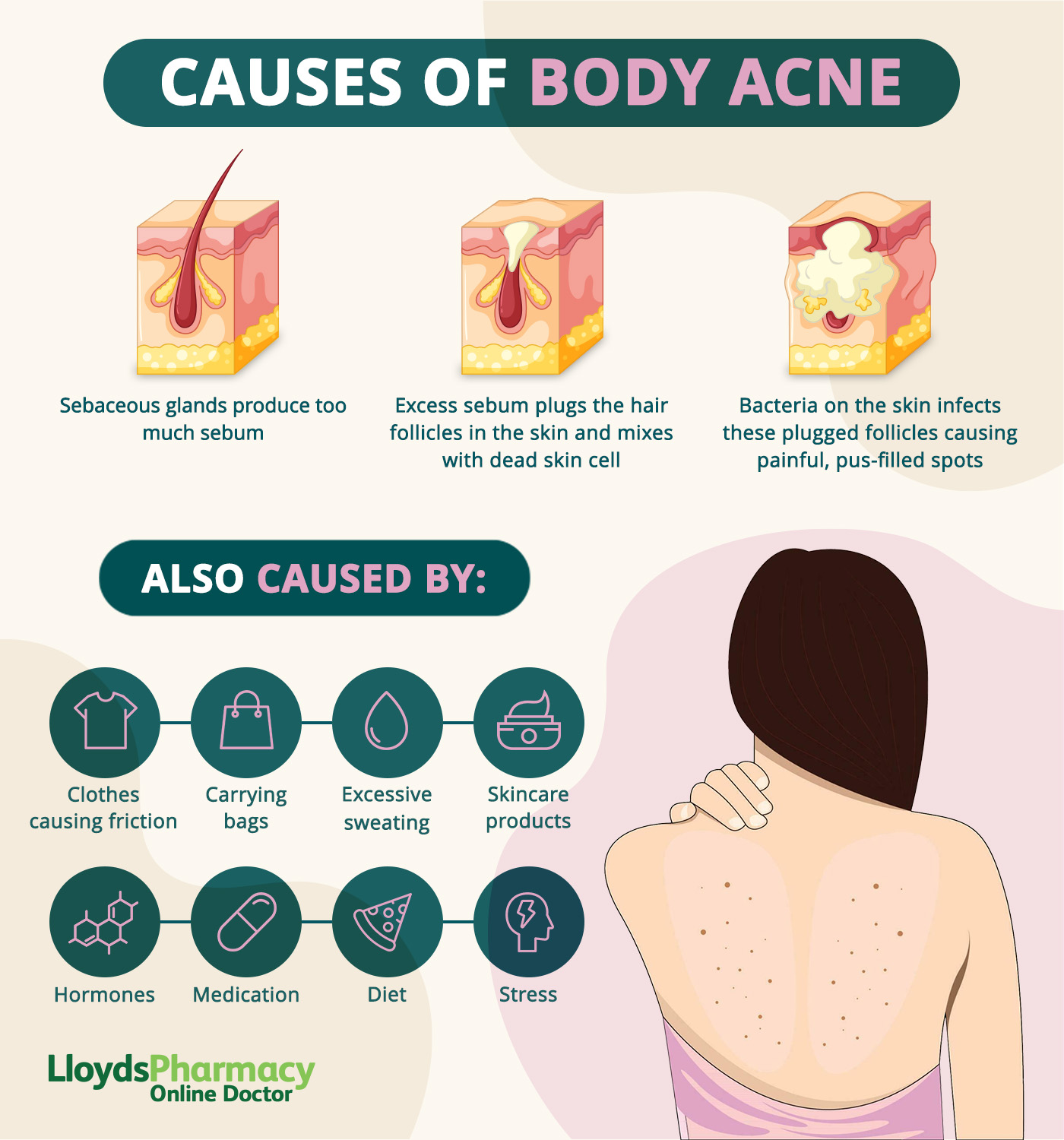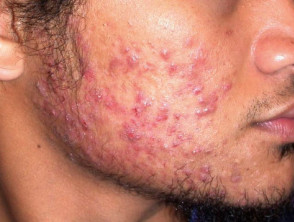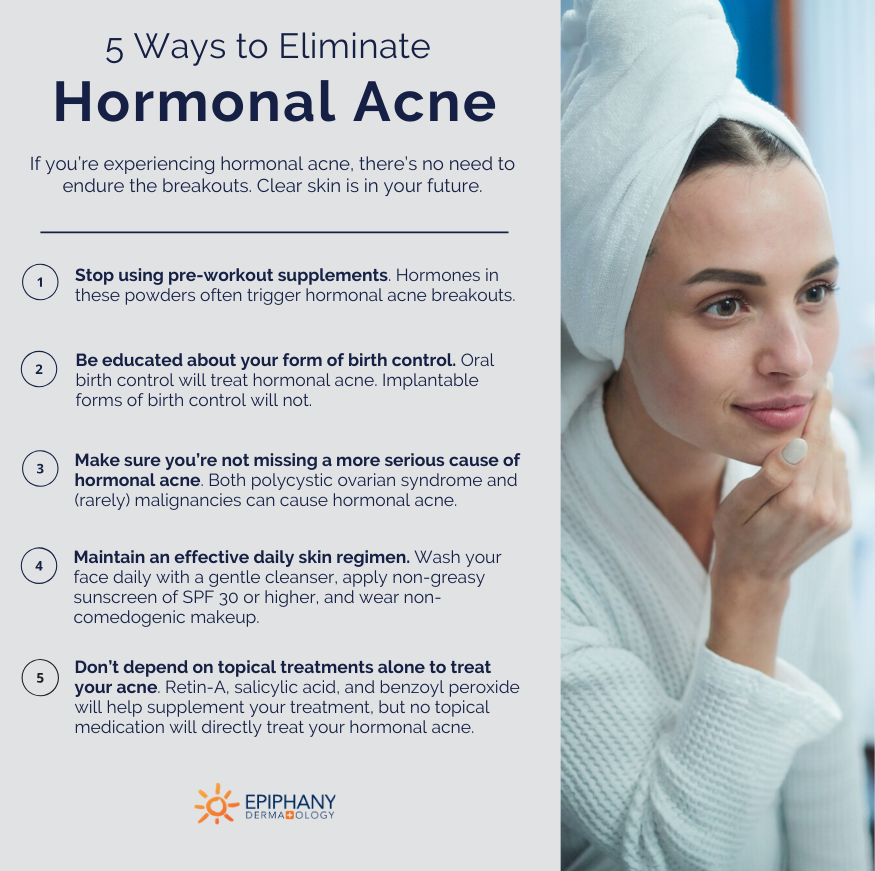To get rid of acne caused by medication, consult your doctor and maintain a gentle skincare routine. Avoid harsh products and keep your skin hydrated.
Acne caused by medication, often known as drug-induced acne, can be frustrating. Certain medications trigger this condition due to their impact on hormone levels or skin reactions. Common culprits include corticosteroids, lithium, and certain contraceptives. It’s essential to address this issue promptly to prevent scarring and prolonged discomfort.
Always consult your healthcare provider before making any changes to your medication. A gentle skincare routine tailored to sensitive skin can help manage breakouts. This includes using non-comedogenic products, cleansing twice daily, and moisturizing regularly. With proper care and medical guidance, you can effectively manage and reduce acne caused by medication.
Introduction To Medication-induced Acne
Medication-induced acne can be frustrating. Sometimes, medicines designed to help can cause pimples. Understanding why this happens is important. It helps you take the right steps to treat it.
The Prevalence Of Acne As A Side Effect
Many people experience acne as a side effect of medications. This condition is common. It can affect people of all ages. Some medications cause the skin to produce more oil. This leads to clogged pores and breakouts. Other medicines may change the way skin cells grow.
Identifying The Culprit: Medications That Cause Acne
Certain medications are known to cause acne. It is important to know which ones are common culprits.
| Type of Medication | Examples |
|---|---|
| Steroids | Prednisone, Cortisone |
| Anticonvulsants | Phenytoin, Carbamazepine |
| Hormonal Medications | Testosterone, Birth Control Pills |
| Lithium | Used for bipolar disorder |
| Isoniazid | Used for tuberculosis |
Monitoring your skin is crucial when starting a new medication. If breakouts occur, consult your doctor. They may adjust your dosage or prescribe a different drug. Keeping a medication diary can help you track changes in your skin.

Credit: www.araahskinmiracle.com
Understanding Skin Reactions To Medication
Understanding how your skin reacts to medication is crucial. Some medications can cause acne. Knowing why this happens can help you manage it better.
How Medications Trigger Acne
Medications can trigger acne in several ways. Some drugs cause the skin to produce more oil. Excess oil can clog pores. This leads to acne. Steroids, for example, are known to cause this issue. Another way is through inflammation. Some medications cause skin inflammation. This can make acne worse.
The Role Of Hormones And Immune Response
Hormones play a big role in acne. Some medications affect hormone levels. Birth control pills are a common example. They can change hormone levels. This can lead to acne. The immune response is also important. Some drugs affect the immune system. This can cause inflammation in the skin. Inflammation makes acne worse.
| Medication Type | Effect on Skin |
|---|---|
| Steroids | Increases oil production |
| Birth Control Pills | Alters hormone levels |
| Immunosuppressants | Causes skin inflammation |
- Use oil-free skincare products. These can help reduce clogged pores.
- Maintain a healthy diet. Eat fruits and vegetables. They help your skin stay healthy.
- Stay hydrated. Drink plenty of water. It helps flush out toxins.
- Consult your doctor. They can suggest alternative medications.
- Follow a skincare routine. Clean your face twice a day. Use gentle products.
- Avoid touching your face. Your hands carry bacteria. This can worsen acne.
Immediate Actions To Take
Dealing with acne caused by medication can be frustrating. Taking immediate actions can help control and reduce the breakout. Here are some steps you can take right away to address this issue.
Consulting Your Healthcare Provider
The first step is to consult your healthcare provider. They can confirm if your medication is the cause of your acne. Your doctor may have alternative medications that do not cause breakouts. Always seek their advice before making any changes.
Temporary Suspension Of The Offending Medication
In some cases, temporary suspension of the medication might be necessary. Your doctor will guide you on how to safely stop the medication. Do not stop taking your medication without consulting your healthcare provider.
Here’s a simple table to summarize the steps:
| Action | Details |
|---|---|
| Consult Healthcare Provider | Confirm if medication causes acne |
| Temporary Suspension | Follow doctor’s advice to safely stop medication |
Taking these immediate actions can help manage medication-induced acne. Always keep your healthcare provider informed.
Topical Remedies And Treatments
Acne caused by medication can be frustrating. Fortunately, topical remedies and treatments can help manage and reduce it. This section covers both over-the-counter solutions and prescription topical medications. These options can bring relief and improve your skin health.
Over-the-counter Solutions
Many over-the-counter products can help treat acne caused by medication. Here are some effective options:
- Benzoyl Peroxide: Kills bacteria and reduces inflammation.
- Salicylic Acid: Helps to unclog pores and exfoliate skin.
- Alpha Hydroxy Acids (AHAs): Removes dead skin cells and promotes new skin growth.
These products are easy to find in pharmacies. Always follow the instructions on the label.
Prescription Topical Medications
If over-the-counter products don’t work, consider prescription options. Dermatologists often prescribe these treatments:
- Topical Antibiotics: Reduce bacteria and inflammation on the skin.
- Retinoids: Promote cell turnover and prevent clogged pores.
- Azelaic Acid: Reduces bacteria and helps to clear pores.
Prescription medications are stronger and may work faster. Always use them under the guidance of a healthcare provider.
| Product | Type | Benefits |
|---|---|---|
| Benzoyl Peroxide | Over-the-Counter | Kills bacteria and reduces inflammation |
| Salicylic Acid | Over-the-Counter | Unclogs pores and exfoliates skin |
| Topical Antibiotics | Prescription | Reduces bacteria and inflammation |
| Retinoids | Prescription | Promotes cell turnover and prevents clogged pores |
Both over-the-counter and prescription options can be effective. Choose the right treatment based on your skin type and severity of acne.
Oral Medications For Acne Management
Acne caused by medication can be challenging. Oral medications can help manage this issue effectively. These treatments target the root causes of acne. They work from the inside out. Below, we discuss two primary types of oral medications for acne management.
Antibiotics And Their Impact
Antibiotics are often prescribed to treat acne. They help by reducing inflammation and bacterial growth. Common antibiotics for acne include:
- Doxycycline
- Minocycline
- Erythromycin
These medications are usually taken for a few months. They target bacteria that cause acne. Reducing inflammation helps to clear the skin. Long-term use can lead to antibiotic resistance. Doctors often recommend combining antibiotics with other treatments. This approach helps to minimize risks.
Isotretinoin: Benefits And Risks
Isotretinoin is another powerful oral medication for acne. It is often used for severe cases. This drug is known for its effectiveness and long-lasting results. Patients typically take Isotretinoin for 4-6 months. Benefits include:
| Benefits | Risks |
|---|---|
| Reduces oil production | Dry skin and lips |
| Decreases bacteria | Birth defects if pregnant |
| Minimizes inflammation | Mood changes |
While effective, Isotretinoin comes with significant risks. Patients must undergo regular blood tests. Women must use birth control during treatment. This helps to avoid severe side effects. Always follow your doctor’s advice.

Credit: onlinedoctor.lloydspharmacy.com
Lifestyle Adjustments For Clearer Skin
Acne caused by medication can be frustrating. Making simple lifestyle adjustments can help. These changes can improve your skin’s health. Below are some tips to get you started.
Dietary Changes For Acne Control
Your diet plays a crucial role in skin health. Eating the right foods can help reduce acne.
- Increase water intake: Drink at least 8 glasses of water daily.
- Eat more fruits and vegetables: They provide essential vitamins and minerals.
- Avoid sugary foods: High sugar levels can cause acne flare-ups.
- Reduce dairy products: Dairy can sometimes worsen acne.
- Choose whole grains: Whole grains are better than refined ones.
Stress Management Techniques
Stress can make acne worse. Managing stress is important for clear skin.
- Practice deep breathing: Take deep breaths to calm your mind.
- Exercise regularly: Physical activity reduces stress levels.
- Get enough sleep: Aim for at least 7-8 hours of sleep each night.
- Try meditation: Meditation can help reduce stress.
- Engage in hobbies: Doing things you enjoy can lower stress.
Making these lifestyle changes can help you get rid of acne caused by medication. Your skin will thank you for it!
Skin Care Routines To Prevent Flare-ups
Medication can sometimes cause acne flare-ups. Establishing a proper skin care routine is essential. Follow these tips to keep your skin clear and healthy.
Gentle Cleansing Practices
Cleansing your skin gently can prevent irritation. Avoid harsh soaps that strip natural oils. Use a mild cleanser twice a day. This helps remove dirt and excess oil without causing dryness.
| Dos | Don’ts |
|---|---|
| Use lukewarm water | Avoid hot water |
| Pat your skin dry | Don’t rub vigorously |
| Choose a fragrance-free cleanser | Avoid fragranced products |
Non-comedogenic Products To Use
Non-comedogenic products are less likely to clog pores. Opt for products labeled as “non-comedogenic.” This includes moisturizers, sunscreens, and makeup.
- Moisturizers: Look for lightweight, oil-free options.
- Sunscreens: Choose broad-spectrum SPF that is non-comedogenic.
- Makeup: Use mineral-based makeup to prevent breakouts.
Avoid products with heavy oils or butters. These can clog pores and worsen acne.

Credit: dermnetnz.org
Alternative And Natural Remedies
Acne caused by medication can be frustrating. Many seek alternative and natural remedies for relief. These methods can be effective and gentle on the skin. This section explores herbal supplements and homeopathic approaches to tackle medication-induced acne.
Herbal Supplements And Their Efficacy
Herbal supplements can help manage acne. They are natural and often come with fewer side effects. Here are some popular options:
| Herbal Supplement | Benefits |
|---|---|
| Tea Tree Oil | Reduces inflammation and fights bacteria. |
| Aloe Vera | Soothes skin and reduces redness. |
| Green Tea Extract | Rich in antioxidants, reduces sebum production. |
| Turmeric | Anti-inflammatory, reduces swelling. |
Homeopathic Approaches
Homeopathy offers another route to clear skin. It uses tiny doses of natural substances. These substances help the body heal itself. Here are some common homeopathic remedies:
- Sulphur: Best for red, itchy acne.
- Hepar Sulph: Works on painful pimples.
- Silicea: Helps with deep, cystic acne.
- Calcarea Sulph: Clears up yellow pus-filled acne.
Both herbal supplements and homeopathic remedies offer natural ways to fight acne. Always consult with a healthcare provider before trying new treatments.
When To Consider Professional Treatment
Sometimes, acne caused by medication can be stubborn. Over-the-counter products may not work. In such cases, it’s best to seek professional treatment. Dermatologists have specialized tools and knowledge. They can help you tackle persistent acne effectively.
Dermatological Procedures
Dermatological procedures can provide quick and effective results. Here are some common procedures:
- Laser Therapy: This method uses light to reduce acne and scars.
- Chemical Peels: These exfoliate the skin and remove dead cells.
- Microdermabrasion: This procedure removes the top layer of skin, promoting new skin growth.
- Extraction: A dermatologist can manually remove blackheads and whiteheads.
These procedures can be more effective than home treatments. They offer a targeted approach to clear your skin.
Seeking A Second Opinion
If your dermatologist’s treatment plan isn’t working, it might be time for a second opinion. Different dermatologists may have varied approaches. A new perspective can sometimes lead to better results.
Here are some steps to take:
- Make a list of your current treatments.
- Document your acne history and any changes noticed.
- Consult with another dermatologist.
Getting another opinion can help you find the best treatment for your skin. It ensures you are on the right path to clear, healthy skin.
Prevention Strategies For The Future
Acne caused by medication can be frustrating. Preventing future breakouts requires strategic steps. Here are some effective prevention strategies to keep acne at bay.
Monitoring Medication Side Effects
Always read the side effects of any medication you take. Some medications list acne as a possible side effect. If you notice acne forming after starting a new medication, inform your doctor. Your doctor might change your prescription or adjust the dosage.
Regularly track your skin’s condition. Keep a journal of any changes you notice. This can help identify if a specific medication is causing acne. If needed, consult your dermatologist for advice.
Maintaining An Acne-free Regimen
Follow a consistent skincare routine. Cleanse your face twice daily using a gentle cleanser. Use non-comedogenic products to avoid clogging pores. Apply a light moisturizer to keep your skin hydrated.
Exfoliate your skin once a week. This helps remove dead skin cells and prevents clogged pores. Use a gentle exfoliant to avoid irritating your skin. Always wear sunscreen to protect your skin from UV damage.
Ensure a balanced diet. Eat foods rich in vitamins and minerals. Avoid oily and sugary foods that can trigger breakouts. Drink plenty of water to keep your skin hydrated.
Avoid touching your face with dirty hands. Bacteria from your hands can transfer to your face and cause acne. Keep your hair clean and away from your face to prevent oil transfer.
Lastly, manage stress effectively. Stress can trigger hormonal changes that cause acne. Practice relaxation techniques like yoga or meditation to keep stress levels low.
Conclusion: Empowerment Through Knowledge
Understanding how to tackle acne caused by medication can be empowering. Knowledge equips you with the tools to regain control over your skin health. By following the right steps, you can minimize breakouts and enjoy clearer skin.
Taking Charge Of Your Skin Health
Taking charge of your skin health begins with knowing your skin type. Use gentle, non-comedogenic products. These products prevent clogged pores. Daily skincare routines are crucial. Cleanse your face twice a day. Moisturize with a product suitable for your skin type. Exfoliate weekly to remove dead skin cells. Avoid harsh scrubs that irritate your skin.
Consult a dermatologist if your acne persists. They can recommend suitable treatments. Some medications cause acne. Discuss alternatives with your doctor. Never stop medication without medical advice. Hydrate your skin by drinking plenty of water. Eat a balanced diet rich in fruits and vegetables. Avoid sugary and greasy foods.
Building A Support System
Building a support system helps you stay motivated. Talk to friends and family about your acne struggles. Join online forums or support groups. Sharing experiences can reduce stress. Seek professional help if acne affects your mental health. Therapists can offer coping strategies.
Create a routine and stick to it. Track your progress by taking photos of your skin. Celebrate small victories. Stay patient and consistent. Acne treatment takes time. Positive reinforcement from your support system can boost your confidence.
Empowerment through knowledge means making informed decisions. Stay updated with the latest skincare trends. Read articles and watch videos on acne treatment. Educate yourself about ingredients in skincare products. Avoid those that trigger acne. Knowledge is power. Use it to achieve healthier skin.
Frequently Asked Questions
Will Acne Caused By The Pill Go Away?
Yes, acne caused by the pill often goes away after a few months. Consult your doctor for personalized advice.
How Do You Get Rid Of Acne With Medication?
To get rid of acne with medication, use topical treatments like benzoyl peroxide or salicylic acid. Oral antibiotics or hormonal treatments may also help. Consult a dermatologist for a personalized plan.
Why Do I Still Have Acne After Medication?
Acne can persist due to hormonal imbalances, stress, diet, or ineffective medication. Consult your dermatologist for alternative treatments.
Why Do Acne Medications Cause Initial Breakouts?
Acne medications cause initial breakouts by accelerating skin cell turnover. This process brings underlying impurities to the surface.
Conclusion
Achieving clear skin while on medication is possible with the right approach. Follow your doctor’s advice and maintain a consistent skincare routine. Stay hydrated and eat a balanced diet. Patience is key, as results may take time. Remember, healthy habits and professional guidance are essential for managing acne effectively.

